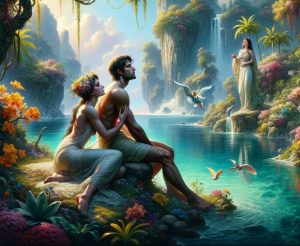A Tale of Love, Captivity, and Liberation

Odysseus finds himself stranded on Ogygia after his shipwreck and is held captive by Calypso for years. Despite being tempted by immortality and eternal youth offered by Calypso, Odysseus longs to return to his wife Penelope in Ithaca.
The relationship between Calypso and Odysseus highlights themes of temptation, desire, and longing in Greek mythology. It delves into the complexities of love versus duty and the struggle between mortal desires and divine intervention.
Calypso’s character embodies both allure and loneliness as she navigates her feelings for Odysseus while grappling with her own fate as an immortal nymph. This intricate tale showcases the intricate web woven by gods and mortals alike in ancient Greek myths.
The narrative of Odysseus’s stay on the island of Ogygia, home to the nymph Calypso, is one of the most poignant episodes in Homer’s “Odyssey.” This tale encapsulates themes of longing, divine intervention, and the indomitable human spirit’s quest for home and freedom.
After enduring a shipwreck caused by Poseidon’s wrath, Odysseus finds himself washed ashore on Ogygia, the secluded island where Calypso resides. Calypso, a daughter of the Titan Atlas, is a powerful nymph with divine attributes, living in a deep forest surrounded by immortals. She discovers the exhausted hero on the beach and, taking pity on him, offers him refuge.
Calypso’s island is depicted as a paradisiacal realm, an epitome of natural beauty and eternal tranquility. It is a place where time seems to stand still, far removed from the mortal world’s sorrows and strife. Despite its allure, for Odysseus, it becomes a gilded cage.
Calypso falls deeply in love with Odysseus, and out of desire to keep him with her forever, she offers him immortality if he agrees to stay on the island as her husband. Despite the comfort and affection offered by Calypso, Odysseus’s heart remains in Ithaca, with his wife, Penelope, and his son, Telemachus, whom he has not seen in years.
For seven long years, Odysseus remains on Ogygia, torn between the comfort of his life with Calypso and his yearning to return to his homeland. He spends his days gazing out to sea, longing for his home and family, a prisoner of his own desires and Calypso’s love.
The gods, watching Odysseus’s plight, decide to intervene. Athena, Odysseus’s divine patroness, pleads with Zeus to order Calypso to release Odysseus so he may return to Ithaca. Zeus, in turn, sends Hermes, the messenger god, to Ogygia with the decree.
Calypso, though heartbroken, agrees to let Odysseus go, demonstrating the inevitability of divine will over personal desires. Before his departure, she provides him with tools and resources to build a raft and supplies for his journey, showing her love and generosity even in loss.
Odysseus’s stay on Ogygia raises profound questions about freedom, fate, and the nature of human desire. Calypso’s island represents a tempting escape from reality, a place of eternal comfort and ease, yet devoid of true fulfillment for those who, like Odysseus, have uncompleted destinies to fulfill.
The story also highlights the ancients’ belief in the gods’ role in human affairs, where divine intervention can both detain and deliver. Odysseus’s eventual departure from Calypso, aided by the gods, symbolizes the triumph of human will and destiny over divine temptation and the ephemeral nature of mortal desires.
Odysseus’s ordeal on the island of Calypso remains a timeless narrative about the human condition’s complexities. It reminds us of the enduring power of love, the pain of separation, and the unquenchable human longing for freedom and homecoming, themes as relevant today as they were in the ancient world.
